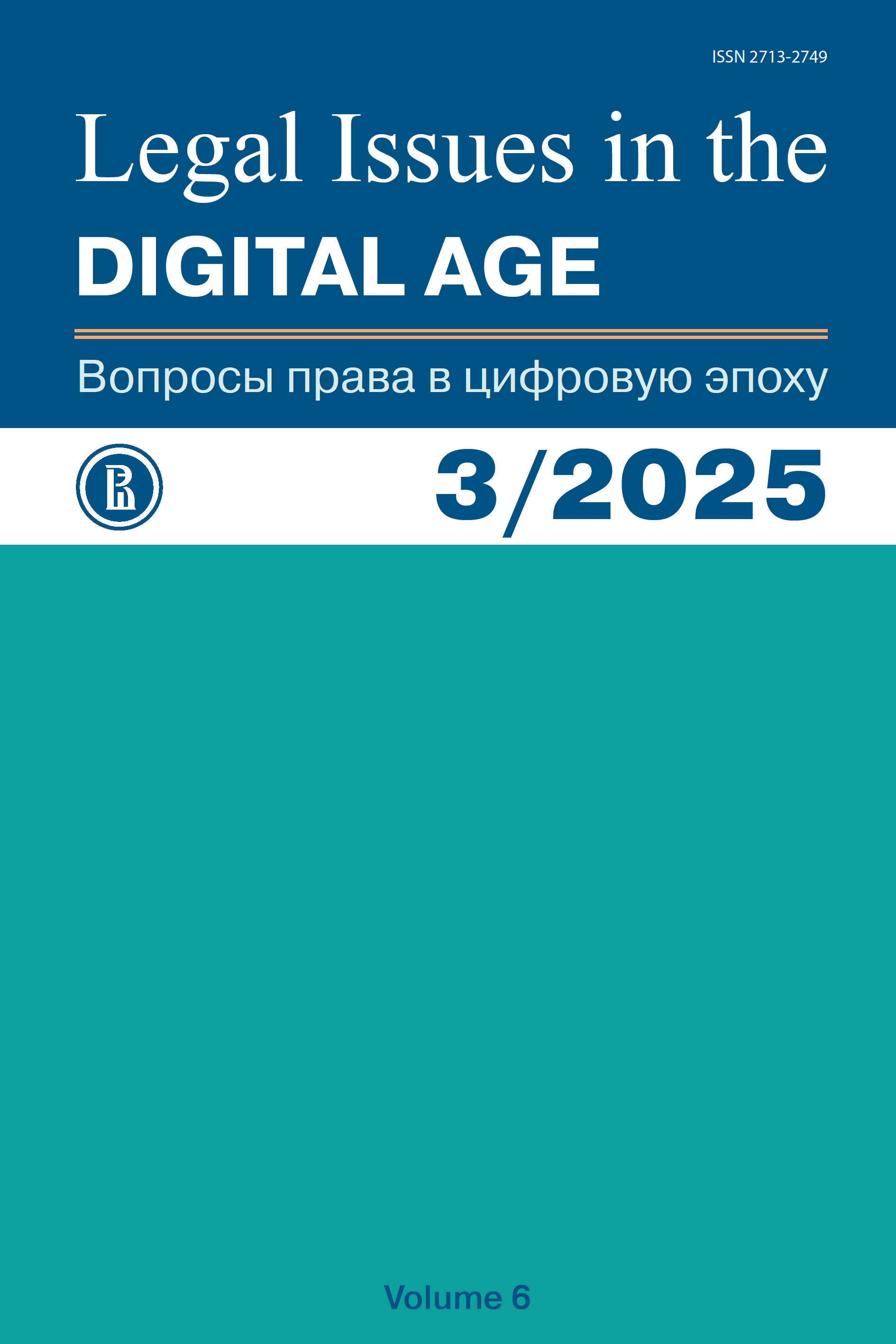What is “Regulatory Path” for Russia?
Аннотация
The article discusses how exactly artificial intelligence technologies are regulated in Russia with analysis of key regulatory trends observed internationally, including stepping up of international cooperation, prevalence of flexible, adaptive regulatory options over one-size-fits-all approach, as well as regulatory focus on generative artificial intelligence and ethical issues. A special emphasis is made on exploration of the Russian regulatory model for artificial intelligence. Rather than following in the wake of the European Union with its universal, comprehensive Artificial Intelligence Act, Russia has opted for a horizontal regulatory approach covering different economic and social sectors. The article present discusses a set of regulations governing the relationships associated with artificial intelligence including strategic documents, legal acts on regulatory sandboxes, regulation of medical AI applications, data access mechanisms, etc. It is argued that Russia follows the path of building a comprehensive regulatory system for AI based on a hybrid approach combining statutory, ethical and technical regulation for a balance between supporting innovation and protecting public interests.
Литература
Arzamasov Yu.G. (2023) An optimal regulatory model for AI. Vestnik voronezhskogo gosudarstvennogo universiteta. Seria Law=Voronezh State University Herald, Law Series, no. 2, pp. 133–148 (in Russ.)
Bakhteev D.V. (2024) Legal status of AI systems and differentiation of liability for harm. Russkiy zakon=Lex Russica, no. 4, pp. 9–23 (in Russ.)
Baturin Yu.M., Polubinskaya S.V. (2022) Artificial intelligence: legal status or legal regime? Gosudarstvo i pravo=State and Law, no. 10, pp. 141–154 (in Russ.)
Bodini M. (2024) Generative artificial intelligence and regulations: can we plan a resilient journey? Societies, no. 12, p. 268.
Buryaga B.O., Dzyuzhoma V.V., Artemenko E.A. (2025) Shaping AI regulatory model: international and national experience. Legal Issues in the Digital Age, vol. 6, no. 2, pp. 50–68.
Ibraghimov R.S. et al. (2021) AI ethics and regulation. Zakon=Statute, no. 8, pp. 85–95 (in Russ.)
Kharitonova Yu.S., Savina V.S. (2020) AI technologies and law: challenges of the day. Vestnik Permskogo gosudarstvennogo universiteta. Juridichesheskie nauki=Perm State University Herald. Legal Sciences, no. 49, pp. 524–549 (in Russ.)
Kozlov I.N. (2025) Legal aspects of AI regulation as a factor of sustainable social development and technological progress. Akademicheskiy issledovatelskiy zhurnal=Academic Research Journal, no. 1, pp. 209–222 (in Russ.)
Li Yao (2023) Specifics of Regulatory and Legal Regulation of Generative Artificial Intelligence in the UK, USA, EU and China. Pravo. Zhurnal Vysshey shkoly ekonomiki=Law. Journal of the Higher School of Economics, vol. 16, no. 3, pp. 245–267 (in Russ.)
Martynova E.A. et al. (2024) Comments on the Council of Europe’s Framework Convention on AI, human rights, democracy and rule of law. Zhurnal mezhdunarodnogo prava Vysshey shkoly ekonomiki=The Higher School of Economics Journal of International Law, no. 3, pp. 52–63 (in Russ.)
Maslova E.A. et al. (2022) AI regulation in Russia: eclectic approaches and actors. Sravnitelnaya politika=Comparative Politics, no. 4, pp. 65–84 (in Russ.)
Sukharev A.N. (2021) On the prospects of regulating AI in Russia. Vestnik Twerskogo gosudarstvennogo universiteta. Seria Pravo=Tver State University Herald. Law Series, no. 3, pp. 13–19 (in Russ.)
Talapina E.V. (2020) Algorithms and AI through the lens of human rights. Zhurnal rossiyskogo prava=Journal of Russian Law, no. 10, pp. 25–39 (in Russ.)
Wittenberg C. et al. (2024) Labeling AI-Generated content: promises, perils, and future directions. Massachusets Institute of Technology Case Studies in Social and Ethical Responsibilities of Computing, pp. 71–89.
Copyright (c) 2025 Neznamov A.V., Chache E.G., Churilova D.Yu.

Это произведение доступно по лицензии Creative Commons «Attribution-ShareAlike» («Атрибуция — На тех же условиях») 4.0 Всемирная.
Авторы, присылающие рукописи для рассмотрения к публикации в Журнале, принимают Политику лицензирования, авторских прав, открытого доступа и использования репозиториев.









